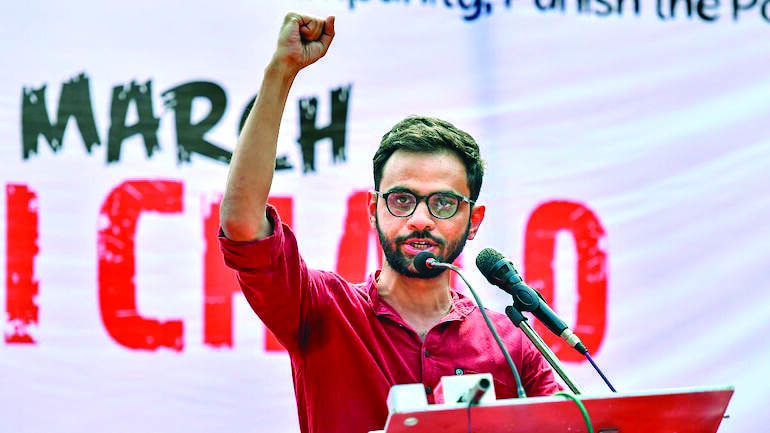Former JNU student leader Umar Khalid denied bail

New Delhi: Despite admitting that there were "some inconsistencies" in the statements of some protected witnesses, a Delhi court on Thursday denied bail to former JNU student leader Umar Khalid in the UAPA case related to the larger conspiracy behind the Delhi riots of February 2020, noting that "a cumulative reading of statements of all the witnesses and other events presented in the charge-sheet" showed "reasonable grounds" to believe that the allegations against Umar were prima facie true.
After having deferred the order on his bail plea three times since reserving it, the court on Thursday pronounced the order denying Umar bail in the case.
Even though the court agreed with senior advocate Trideep Pais' arguments for Umar that he had not posted many messages on the chat groups he was part of and none of them were overtly provocative or incriminatory, Additional Sessions Judge Amitabh Rawat held: "However, the fact that he was part of such groups created for specific objects and his acts or presence throughout the period beginning from the passing of the CAB Bill in December 2019 till the February 2020 riots, as mentioned above, has to be read in totality and not piecemeal. He has connectivity with many accused persons."
And while the court admitted the inconsistencies in some of the witness statements — as pointed out by Umar's lawyers during the 8-month-long bail hearings — it relied on many of the witness statements to reject the defence's arguments.
On the argument that Umar was not present in Delhi during the time of the riots, the court cited statements of protected witness "Neon" to imply that Umar had deliberately insisted on leaving the city on February 23, 2020 — supporting the prosecution's contention that he was trying to "create a perfect alibi" for himself.
Justifying the denial of bail to Umar, the court said: "I agree with the Ld. Senior Advocate that there are some inconsistencies in the statements of some protected witnesses; however, a finding has to be given on a cumulative reading of statements of all the witnesses and other events presented in the chargesheet."
The court also rejected the defence's contention that Umar was a researcher and that his bent of mind can be assessed from his doctoral thesis on welfare aspects of Adivasis of Jharkhand and other writings, saying it was irrelevant in deciding the bail application.
"If the bent of mind is to be assessed in this manner, then co-accused Sharjeel Imam has written thesis on riots but any thesis or research work, by itself, done by any accused cannot be a ground for assessing mens rea or his bent of mind," the judge said.
A bail application must be decided on facts presented in charge-sheet, he said, noting in his order: "It is also important to highlight that in a conspiracy, various continuous acts are committed by different accused persons. One act cannot be read in isolation. At times, if read by itself, a particular act or an activity may appear innocuous, but if it is a part of chain of events constituting a conspiracy, then all the events must be read together."
In its reading of the charge-sheet in the case, the court noted that Umar's name finds mention from the beginning of the alleged conspiracy right until the riots. It went on to note that he was also part of several of the meetings that the prosecution has alleged were part of the conspiracy. ASJ Rawat added Umar had referred to then US President Donald Trump's visit in his Amravati speech and had also been mentioned in the flurry of calls that took place after the rioting began.
The court said that there was an intentional blocking of roads to cause inconvenience and to cause disruption of the essential services to the life of community residing in north-east Delhi, causing violence with various means and then leading to February riots.
"The target was to block roads at mixed population areas and encircle the entire area completely stopping the entry and exit of citizens living there and then creating panic to attack on police personnel by women protesters in front only followed by other ordinary people and engulfing the area into a riots and the same would be covered by the definition of terrorist act," the court opined.
"The weapons used, manner of attack and the destruction caused shows it to be preplanned," the court said, adding: "Acts which threaten the unity and integrity of India and causes friction in communal harmony and creates terror in any section of the people, by making them feel surrounded resulting in violence, is also a terrorist act."



